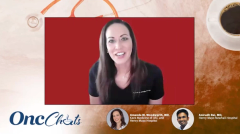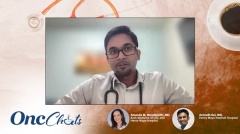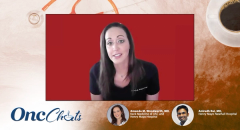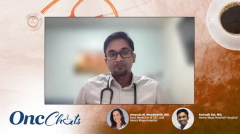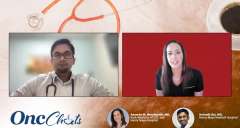
Empowering Community Cancer Care: Integrating Screening Programs
In this episode of OncChats: Empowering Community Cancer Care, experts discuss their collaborative approach to cancer screening, emphasizing the importance of community efforts and individual assessments in integrating genetic testing and screenings into routine practice.
Episodes in this series
In this episode of OncChats: Empowering Community Cancer Care, Amanda M. Woodworth, MD, of Keck Medicine of USC at Henry Mayo Newhall Hospital, and Anirudh Rai, MD, of Henry Mayo Newhall Hospital, discuss their collaborative approach to cancer screening, emphasizing the importance of community efforts and individual assessments in integrating genetic testing and screenings into routine practice.
Rai: Honestly, it is a community effort. The talks and educational part play a big role because that gives us the data and impetus to start programs like, for example, the cancer screening programs we have. We have the ability to do cancer screening right away. Thankfully, we work together with radiologists, with surgeons, and with pulmonologists, to make sure that lung screenings are thorough.
We also have implemented, in our clinic, ways to ask our patients these sorts of questions, as well. [I have a] short example, particularly [with regard to] the lung, [but we] also do this for breast cancer as well. Ultimately, it is an individual approach. We would talk to our patients on an individual basis, but it’s ultimately guided by guidelines and how they relate to the patient’s genetic and medical history. How we implement our programs is based on guideline-based data, and because of that, we have our resources, our surgeons, and our radiologists working together to make sure that no person is slipping through the cracks.
Based on these kinds of ideas, I’m curious about what you’re doing from the genetic aspect, because that is something that’s been interesting from what I understand.
Woodworth: So, yeah, I will tell you, that’s actually one of the great things about Henry Mayo and Santa Clarita. Every woman who comes in for a screening mammogram and requests to participate will be contacted, and through a chatbot, all of their own personal history of cancers, and family histories of cancers and polyps, is all assessed, and it is determined if they meet the national guidelines for genetic testing. If they [do], they’re provided with pre-test education through chatbots and videos, and then, by the time they’ve come in for their mammogram, they’ve already had these preliminary reviews. So, we can see whether they qualify for genetic testing, and if they do, we can actually offer that at the time of their mammogram. Then that allows us, and really you, Dr Rai, to be able to offer a tapered screening approach depending on whether they have a genetic mutation.
I’m certified in cancer genetics and risk assessment, and this sort of proactive approach to screening makes me so excited, but it is also accessible to the community. There have been studies that have come out of the University of Texas MD Anderson Cancer Center and looked at this sort of screening, being able to offer it, not with a genetic counselor, but with chatbots and videos for pre-test education, and that [wasn’t found to be] associated with any more anxiety for the patients than is a genetic counselor. So, it’s a great service that we can offer here.


